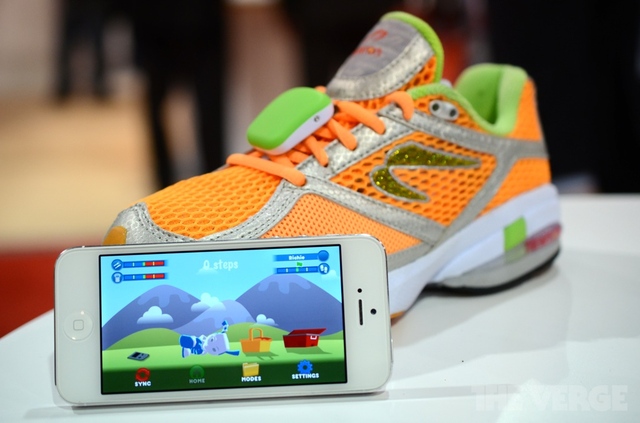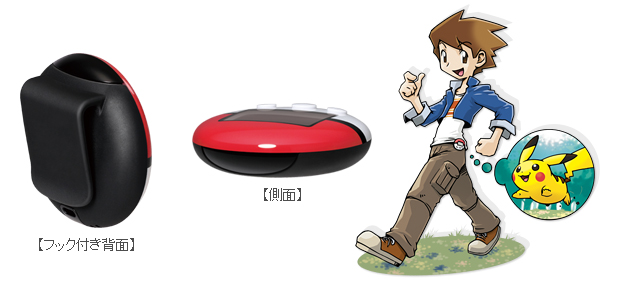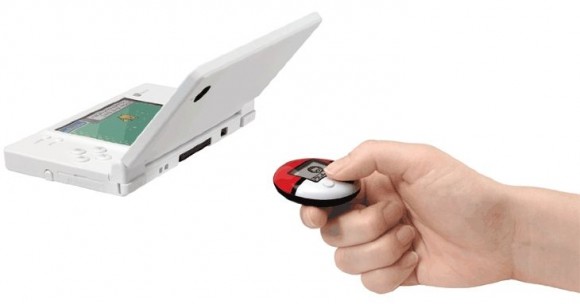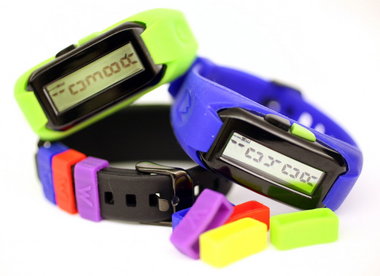
The iBitz Fitness Tracker encourages kids to exercise in order to care for a virtual pet. More info: http://ibitz.com.
There’s a whole lot of talk lately about kids and their low fitness levels in Canada. This week, as example, Healthy Active Kids Canada just released their annual report and gave Canadian kids a grade of “D minus” (yikes!) for overall fitness activity levels. I’ve been working with a client who focuses on this, so I’ve had the opportunity to read into some of the research investigating the roots of this issue and, needless to say, it’s a complex, multifaceted issue. One I’m not going to dig into in this post.
What’s on my mind this morning is something that came up while I was out running (yes, Sarah, I still owe you a post on this because running is not normally in my vocab!) with my grade 5 daughter this morning: Can technology gadgets really help motivate kids to be more active? Or are they just gimmicks for gullible parents?
I’ve always leaned towards skepticism (okay, maybe a little scoffing) when it came to these kinds of gadgets hitting the market. But after seeing how incredibly motivating I’ve found using a FitBit to track my daily steps, I wondered if this kind of gadget could work for kids as well. Plus, the major motivating factor for my daughter to join me running this morning was to get more steps in on her Pokewalker!
This gadget was something I hadn’t even realized I had bought at the time. It came included inside the box of a game for her Nintendo DS console and I had picked up the game for Stella. The Pokewalker is a basically a pedometer, but it is shaped like a Pokeball and when you accumulate a certain number of steps, you can connect wirelessly to a Nintendo DS video game to collect certain characters and rewards to help you win a game. She’s actually had this thing for years and it’s been sitting in her bedroom collecting dust.
Why the sudden interest? Well, I think it’s because she’s been watching how I use my FitBit and she wanted a gadget to use as well. So this led to her hunting around for it. (In fact, I don’t even think she’s touched her Nintendo DS in at least a year.)
But you know what it’s also led her to? Going back to her video game that the Pokewalker is tied to. So I suppose it’s a chicken and egg deal. If your child is already absorbed into video games, a gadget could be a motivator and some exercise is better than none, right?
So on the surface, yes, I suppose could help a child be more active. But (oh, I said I wasn’t going into get into the complexity of this issue, didn’t I?) my daughter also has an adult who’s influenced her to want to use the gadget.
Now what if she didn’t have such an adult — would she still want to use the gadget anyhow? Perhaps. A 2013 study with 138 kids in the US showed that incentives can help kids meet activity goals. In this study, kids were provided with a gift card to a toy store when they met certain monthly targets. The kids who were provided with the incentive met the targets — without their family changing any behaviour or activities.
Now here’s another factor to add to this conversation: Stella is already very active. She walks about 4K every day on her way to and from school and then spends her after-school time running about outside with the neighbourhood kids. She does these things without needing a gadget or other motivator. This is important because experts say that kids will tire of the prizes or rewards offered by technology.
And I fully expect that Stella will drop her interest in the Pokewalker in a couple of weeks time. But will she have dropped her activity levels? No, because she already engages in high levels of activity without any motivation or incentive.
In the end, Active Healthy Kids recommends that tech not be used for encouraging activity: “If money is spent on active video games as a means of exercise, it might be better spent on skipping ropes, balls, ice skates or other sporting equipment.” It’s hard to argue with that logic.
But if your child is interested in using a pedometer in the same way that I use my FitBit — that is, motivating solely by hitting your own self-determined daily target of steps — then I think a tech gadget can work. It’s not tied back to any sedentary activity, nor is it tied to any external incentive like a prize or gift card.
If the FitBit isn’t “cool” enough, there are some really fun pedometers designed for kids and teens that you can consider instead. To get started: On this link, there is a table with recommended stepping targets by age group and on this link you can see some of these gadgets. (Below are brightly coloured MovBand pedometers.)
What do you think … how do you motivate a child who is not interested in exercise? Can tech be used to advantage in these situations?



















Speak Your Mind